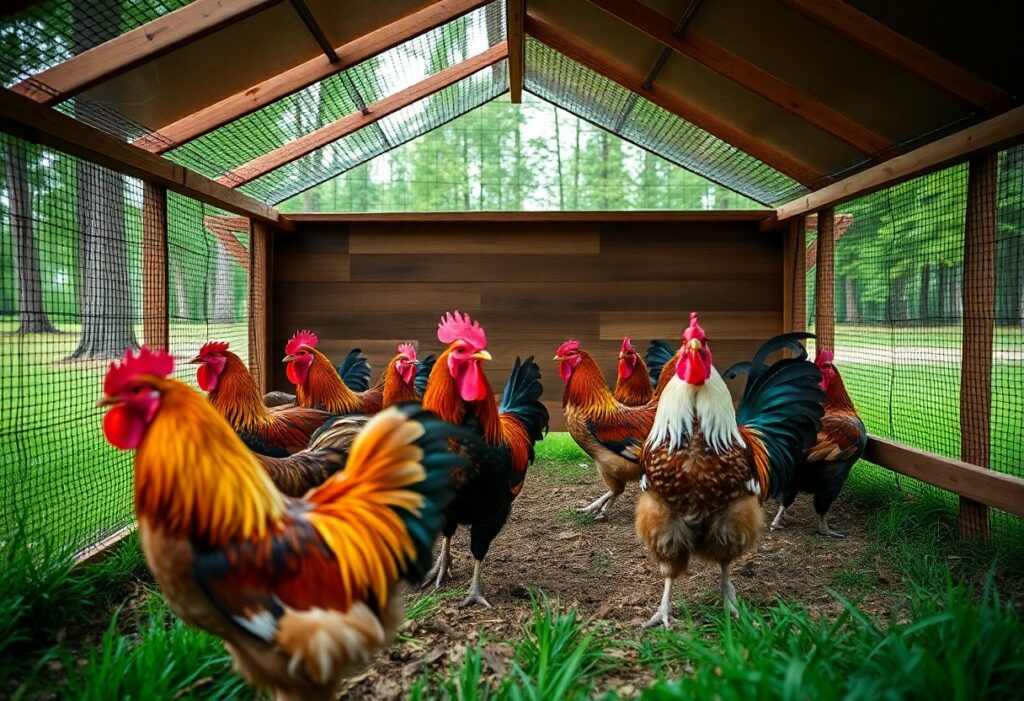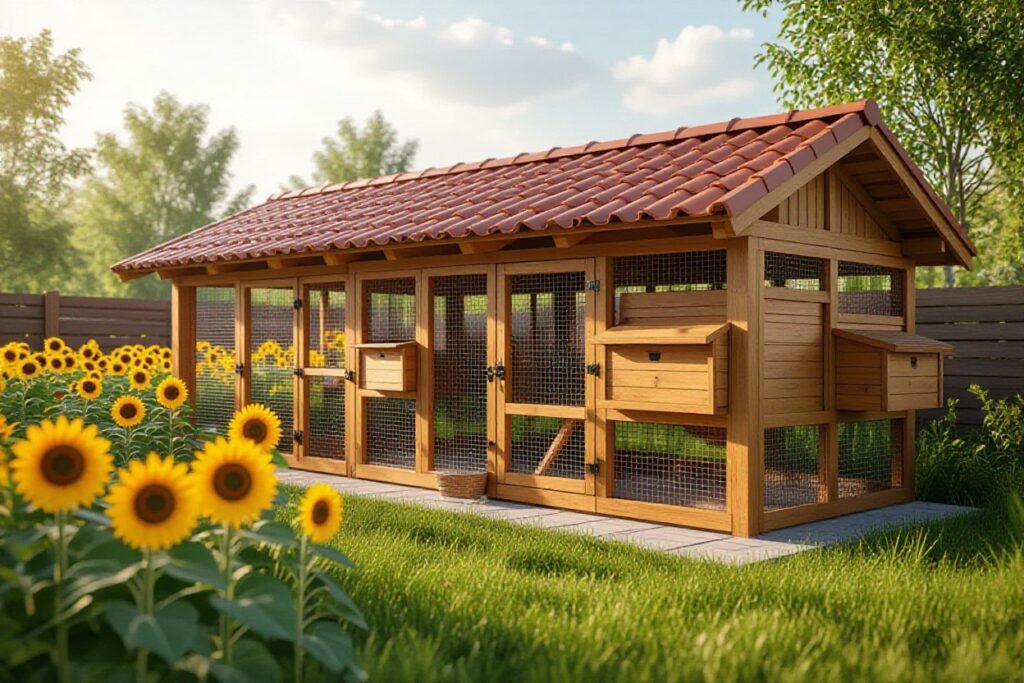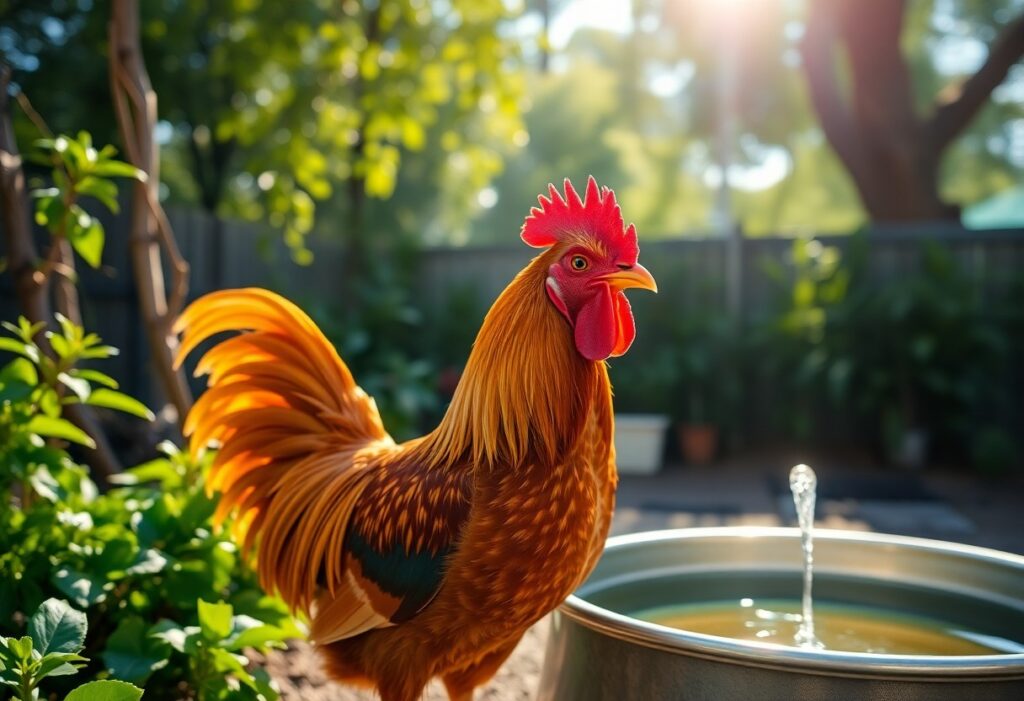You need to understand that adequate shelter plays a vital role in the health and well-being of your roosters. Without a proper habitat, these birds can suffer from stress, disease, and even mortality due to exposure to harsh weather conditions or predators. By providing a safe and comfortable environment, you can enhance their overall health and promote better productivity. This blog post will explore how creating the right shelter can positively impact your roosters, ensuring they thrive and contribute to your flock effectively.
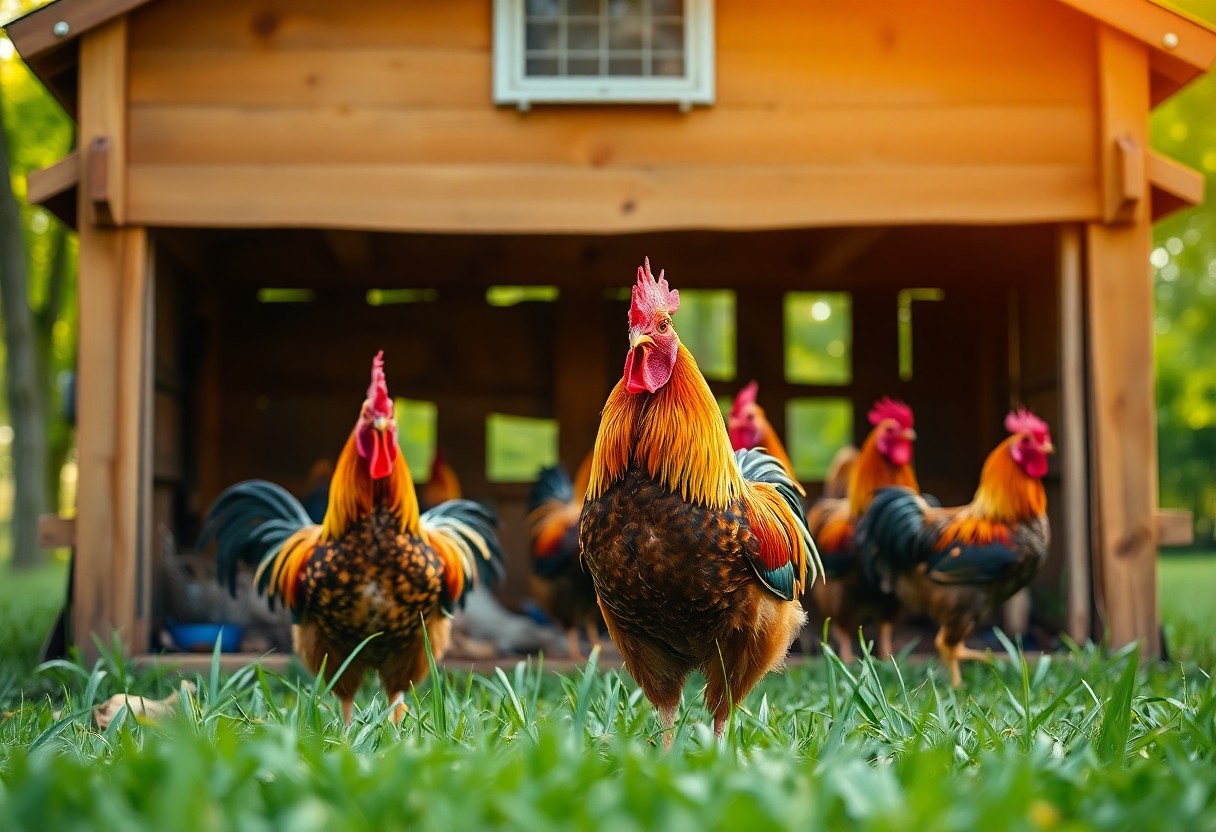
Key Takeaways:
- Proper shelter protects roosters from extreme weather conditions, reducing stress and improving overall health.
- A well-designed shelter promotes cleanliness and prevents the spread of disease, ensuring a healthier living environment.
- Adequate space in shelters allows roosters to establish their pecking order and engage in natural behaviors, contributing to their physical and psychological well-being.
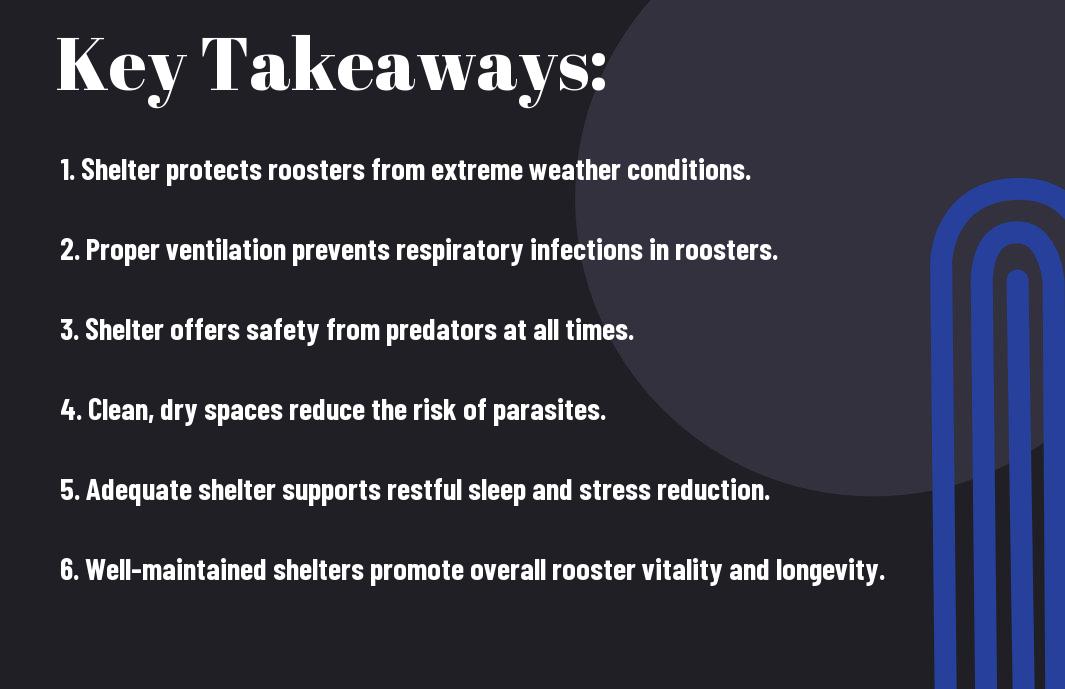
The Role of Shelter in Rooster Health
Your roosters thrive in environments that offer appropriate shelter, which plays a significant role in their overall health. A well-constructed shelter protects them from harsh weather conditions, ensuring they remain comfortable and stress-free. Proper shelter not only provides a safe haven but also aids in maintaining their well-being, allowing them to focus on foraging, socializing, and growing strong.
Protection from Elements
Beside offering a safe retreat, effective shelter shields your roosters from the *elements*, such as wind, rain, snow, and extreme temperatures. By maintaining a stable environment, your birds are less likely to suffer from stress or illness associated with unfavorable weather. Select a design that promotes ventilation while ensuring they remain dry and warm, thus providing them with the comfort they need to thrive.
Prevention of Disease
Role of proper shelter is evident in the prevention of disease among your roosters, as it minimizes their exposure to harmful pathogens. A clean, dry environment reduces the risk of *bacterial* and *viral infections*, and good ventilation diminishes moisture that can lead to respiratory issues. It is vital that you routinely clean the shelter to prevent buildup of waste and parasites, ensuring a healthy atmosphere. Additionally, ensuring adequate space helps reduce stress-related behaviors that can compromise their immunity.
Elements such as overcrowding, poor ventilation, and inadequate cleaning can significantly affect the health of your roosters. When the shelter is not properly maintained, it creates a breeding ground for *disease-causing bacteria* and *parasites*. Regularly inspecting and maintaining your roosters’ shelter will not only keep them *safe* from disease but also promote better overall health. Always aim for a shelter that offers both protection from the elements and facilitates effective *disease prevention*. Prioritizing these factors will lead to a happier and healthier flock.
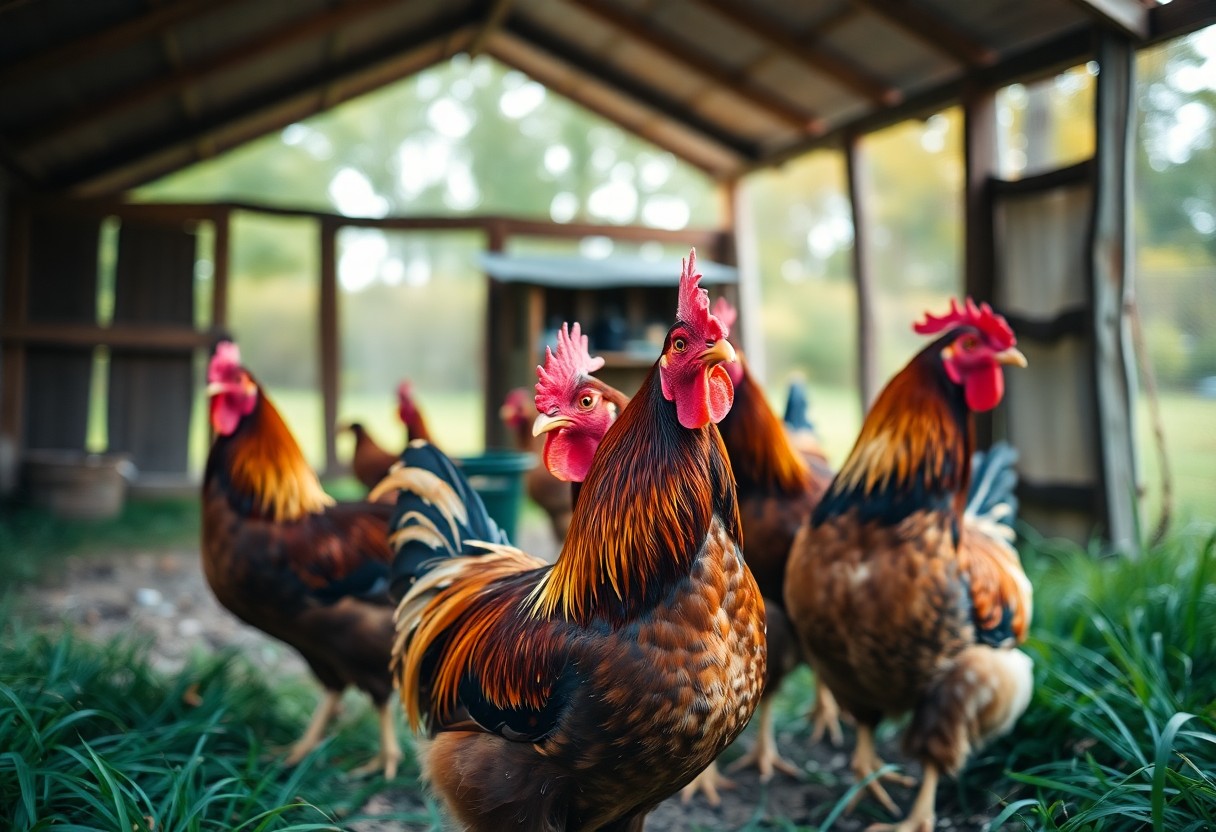
Design Considerations for Rooster Shelters
It is crucial to consider various design elements when constructing a shelter for your roosters. A well-designed shelter not only promotes their health but also improves their overall well-being. Essential factors to focus on include space requirements, ventilation, light exposure, and protection from predators. By taking these aspects into account, you create a safe and comfortable environment that contributes to robust rooster health.
Space Requirements
Between each rooster, you should allow at least 4 to 6 square feet of space within the shelter. This ensures that your birds have enough room to move, establish social hierarchies, and reduce stress from overcrowding. An adequately sized shelter also minimizes potential conflicts, leading to healthier interactions among your roosters.
Ventilation and Light
Above all, proper ventilation and natural light are vital for the health of your roosters. Good airflow helps prevent the buildup of harmful ammonia and humidity, which can negatively affect respiratory health. Natural light supports a healthy day-night cycle, promoting better egg production and overall rooster activity.
In addition, having adequate ventilation channels will help maintain a comfortable temperature within the shelter, especially during hot summer months. You may want to consider adjustable vents that allow you to control airflow based on local weather conditions. Always ensure that your shelter has enough windows or openings so your roosters receive sufficient light exposure. This contributes to their psychological well-being and helps mitigate stress levels, ultimately promoting a healthier living environment for your flock.
Importance of Cleanliness in Shelter
To maintain a healthy environment for your roosters, cleanliness in their shelter cannot be overstated. Keeping the shelter clean helps prevent the buildup of harmful bacteria and parasites that can lead to serious health issues. Regular sanitation not only contributes to your roosters’ well-being but also promotes a safer and more comfortable living space.
Regular Maintenance
On a regular basis, you should perform maintenance tasks such as cleaning droppings, replacing bedding, and disinfecting surfaces. These activities will not only reduce the risk of disease but also create a more pleasant environment for your roosters. Incorporating a consistent cleaning schedule is imperative for ensuring optimal health.
Health Monitoring
One key aspect of promoting rooster health is diligent health monitoring. Regularly observe your roosters for signs of illness or distress, such as changes in behavior, appetite, or appearance. Catching issues early can help you prevent potential outbreaks and ensure that your flock remains healthy and vibrant.
Indeed, active health monitoring should be part of your routine as a responsible rooster keeper. Look for subtle signs of illness, such as lethargy or abnormal droppings, and consult a veterinarian if you notice anything unusual. By taking prompt action, you can safeguard your flock against serious health threats. Your attentiveness is vital for ensuring that your roosters thrive in their environment.
The Impact of Shelter on Rooster Behavior
Many factors influence rooster behavior, and proper shelter plays a significant role in shaping their daily activities and interactions. A well-designed shelter allows roosters to exhibit natural behaviors, such as foraging, dust bathing, and socializing with other flock members. Additionally, consistent access to a secure environment can enhance your roosters’ overall well-being, reducing territorial disputes and promoting a harmonious atmosphere within the flock.
Social Interaction
About proper shelter can significantly enhance social dynamics among roosters. By providing ample space and hiding spots, you allow your roosters to engage in playful interactions, establish pecking orders, and enjoy a less competitive environment. This sense of security fosters bonding and cooperation within the flock, leading to a healthier social structure.
Stress Reduction
For your roosters, a suitable shelter is crucial for stress reduction. A protected area shields them from extreme weather, predators, and environmental stressors, allowing them to feel safe and comfortable.
For instance, when your roosters have access to a well-ventilated, spacious shelter, they can escape harsh weather conditions and avoid potential predatory threats. Such a safe haven minimizes anxiety, encouraging them to engage in natural behaviors. A calm rooster can then enjoy better health and increased productivity, as a less stressed environment promotes a stronger immune system and overall happiness. Thus, investing in proper shelter is not only about protection but is fundamentally linked to the emotional and physical health of your flock.
Seasonal Adjustments for Optimal Shelter
Now, ensuring your rooster’s shelter adapts to the changes of the seasons is necessary for promoting their health. During winter and summer, different challenges arise that require thoughtful alterations to your shelter approach. Taking these seasonal adjustments into account will not only keep your roosters comfortable but also enhance their overall well-being.
Winter Preparation
An effective winter shelter provides your roosters with warmth and protection from harsh elements. Insulating the coop and ensuring proper ventilation while preventing drafts are important factors. Additionally, using heat lamps can provide extra warmth, but be cautious of potential fire hazards. Regularly checking for and eliminating any moisture build-up is key to preventing issues such as frostbite.
Summer Cooling
After the cold months, you need to ensure your roosters do not suffer from heat stress during summer. Providing shaded areas within the shelter and ensuring adequate airflow are vital to keeping them cool. Maintaining a clean water supply is also necessary for hydration.
Even small adjustments can make a significant difference in your roosters’ comfort during summer. For instance, installing ventilation systems or strategically placing fans can improve airflow and decrease the risk of overheating. Consider offering cooling mats or frozen water bottles in their living area to help regulate their body temperature. These interventions not only enhance their well-being but ultimately contribute to their overall health and productivity.
Common Shelter Mistakes to Avoid
After investing time and resources into raising roosters, it’s important to ensure that their shelter is up to par. Many owners unknowingly make mistakes that can negatively affect their birds’ health and wellbeing. By avoiding common pitfalls, you can create a better environment for your roosters, promoting their vitality and comfort.
Overcrowding
Below, you’ll find that overcrowding is one of the most prevalent issues in rooster housing. A cramped space can lead to increased stress, aggression, and disease transmission among your birds. Make sure to provide adequate space for each rooster to move freely and establish a pecking order without constant conflict.
Inadequate Protection
Inadequate protection can expose your roosters to various risks that can harm their health. A shelter lacking proper fencing or roofing can invite predators such as raccoons or foxes, posing a serious threat to your flock. Additionally, extreme weather, whether it’s heat or cold, can jeopardize their health if shelter does not offer insulation and ventilation. Protect your roosters by ensuring that their shelter is secure and weather-resistant.
A well-designed shelter includes sturdy walls and a strong roof to keep out both unwanted animals and harsh weather conditions. Install secure fencing to create a safe perimeter and consider placing additional barriers around your property to deter larger predators. Ensure proper ventilation to prevent heat stress and moisture buildup, which can lead to respiratory issues. By prioritizing your roosters’ safety and comfort through adequate protection, you contribute positively to their overall health.
To wrap up
Presently, understanding the importance of proper shelter for promoting rooster health is vital for any poultry enthusiast. By ensuring your roosters have a safe, clean, and comfortable environment, you significantly enhance their well-being and productivity. This not only protects them from harsh weather and predators but also minimizes stress and potential diseases. Investing in adequate shelter will lay the foundation for a thriving flock, allowing you to enjoy the benefits of healthy, vibrant roosters for years to come.
FAQ
Q: Why is proper shelter necessary for maintaining the health of roosters?
A: Proper shelter is imperative for roosters as it provides protection from harsh weather conditions, such as extreme heat, cold, and rain. Exposure to these elements can lead to stress, which may weaken their immune system and make them more susceptible to diseases. Additionally, appropriate shelter prevents overcrowding and facilitates proper ventilation, reducing the risk of respiratory issues that can arise in poorly designed living conditions.
Q: What characteristics should ideal shelter have for roosters?
A: Ideal shelter for roosters should be well-ventilated to ensure adequate air circulation, which helps regulate temperature and reduce moisture buildup. It should also be insulated against cold weather and have adequate shade during hot months. The shelter should be spacious enough to allow for movement and social interaction while also providing separate areas for nesting and resting. Additionally, secure walls and a roof are important to protect them from predators and pests, which can threaten their health and safety.
Q: How does proper shelter influence rooster behavior and well-being?
A: Proper shelter significantly influences rooster behavior and well-being by creating an environment that promotes natural behaviors. A well-designed space allows roosters to forage, establish a pecking order, and engage in social interactions, all of which are vital for their mental health. Furthermore, a comfortable and secure shelter minimizes stress triggers, leading to healthier roosters with better egg production in hens and improved mating behaviors, contributing to overall flock health and productivity.
